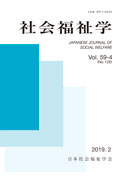Volume 59, Issue 4
Displaying 1-14 of 14 articles from this issue
- |<
- <
- 1
- >
- >|
Original Articles
-
2019Volume 59Issue 4 Pages 1-15
Published: February 28, 2019
Released on J-STAGE: April 10, 2019
Download PDF (527K) -
2019Volume 59Issue 4 Pages 16-29
Published: February 28, 2019
Released on J-STAGE: April 10, 2019
Download PDF (447K) -
2019Volume 59Issue 4 Pages 30-40
Published: February 28, 2019
Released on J-STAGE: April 10, 2019
Download PDF (578K) -
2019Volume 59Issue 4 Pages 41-53
Published: February 28, 2019
Released on J-STAGE: April 10, 2019
Download PDF (455K) -
2019Volume 59Issue 4 Pages 54-66
Published: February 28, 2019
Released on J-STAGE: April 10, 2019
Download PDF (742K) -
2019Volume 59Issue 4 Pages 67-79
Published: February 28, 2019
Released on J-STAGE: April 10, 2019
Download PDF (470K)
Spring Symposium
-
2019Volume 59Issue 4 Pages 80-84
Published: February 28, 2019
Released on J-STAGE: April 10, 2019
Download PDF (344K) -
2019Volume 59Issue 4 Pages 85-88
Published: February 28, 2019
Released on J-STAGE: April 10, 2019
Download PDF (288K) -
2019Volume 59Issue 4 Pages 89-92
Published: February 28, 2019
Released on J-STAGE: April 10, 2019
Download PDF (421K) -
2019Volume 59Issue 4 Pages 93-95
Published: February 28, 2019
Released on J-STAGE: April 10, 2019
Download PDF (291K) -
2019Volume 59Issue 4 Pages 96-100
Published: February 28, 2019
Released on J-STAGE: April 10, 2019
Download PDF (371K)
Book Review
-
2019Volume 59Issue 4 Pages 101-104
Published: February 28, 2019
Released on J-STAGE: April 10, 2019
Download PDF (233K) -
2019Volume 59Issue 4 Pages 105-107
Published: February 28, 2019
Released on J-STAGE: April 10, 2019
Download PDF (212K)
Book Introduction
-
2019Volume 59Issue 4 Pages 108-109
Published: February 28, 2019
Released on J-STAGE: April 10, 2019
Download PDF (137K)
- |<
- <
- 1
- >
- >|
